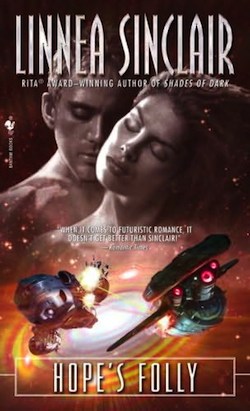Or strides in boldly, as the case may be.
I don’t know if you’ve noticed, but there’s quite a bit of romance in science fiction. Not just the romance of boldly going where none have gone before, either [1], but the kind of romance that gets the folks out there on the harder end of “rigorous” SF all kinds of het up.
[1] Please to remove mind from gutter.
But I’m not really here to talk about the never-ending slapfight between space opera and its more rigorous (dare I say rigid?) cousins. I come to praise Caesar, not to bury him![2] In short, I come to talk about how SFnal military settings have been appropriated for the telling of love stories.
[2] I know, it should really be the other way around.
“Appropriated” is perhaps not the best word here, since it implies that the appropriator has made off with something to which they’re not perfectly entitled. “Made use of” may be more accurate. I find this interesting, as it’s often alleged that the readerships of science fiction and of romance are diametrically opposed. I say alleged, but I have this strange urge to apologise—because, on the one hand, romance can’t be real skiffy, and it doesn’t belong in military science fiction, since it has a different focus: characters; relationships. And on the other hand—depending on who you ask—it can. And it does.
So maybe I’m here to talk about that old slapfight after all.
People smarter and better read than me have talked about this before. Me, I’ve read a limited amount of romance set in space, and—or so I hope—a decent cross-section of milSF. Much of that romance uses military or quasi-military backdrops against which the primary romantic narrative plays out; some of that milSF has romantic relationships in the interstices.
The latter isn’t all that surprising, when you consider that love and war are what we humans, as a species, seem to spend most of our energy on. (Sport is like war, except without the death.) Elizabeth Moon’s Esmay Suiza marries her junior officer husband in the middle of a war. David Weber’s Honor Harrington finds love twice, once tragically. The course of these relationships is not the main focus of these stories, but they would be very different series without them.
The former, however, I do find surprising. Or I did, until I took my head out of its orifice and actually thought about it. A book like The Outback Stars, which takes place in a peacetime navy and revolves around alien artefacts, a very unhappy supplies department, and a romance between officer and enlisted, is exactly the kind of book someone like me—someone who is terribly bored by the conventions of romance as a genre but doesn’t mind getting feelings all up in her SFF, and who enjoys reading about military action and personnel—might enjoy.
Sandra McDonald isn’t the only author who’s seduced [3] me away from straightforward military battles. Two of Linnea Sinclair’s books, Games of Command and Hope’s Folly, take place in entirely military contexts—although I strongly suspect most of her characters would have been booted out of any military that did not orbit the inescapable gravity well of Plot, which perhaps bends these books into space opera territory. Still, I know I read them in the hope of finding a book that can balance milSF’s fascinating qualities—things that go boom, military-political machinations, the exigencies of military service—with the more intriguing aspects of romance—loving relationships between two or more characters, and how they work.
[3] Shoot me before I try to pun again.
Romance is, I will admit, a much more prominent feature of space opera, if only because as soon as it deviates a whit from a straight battles-and-politics focus, we no longer tend to call it military science fiction. I think the line is a blurry one myself: if it’s got uniforms and warships in it, I want to call it military. But that’s my opinion. I’m sure you folks have some other ones.
Liz Bourke is a crabby young feminist SFF fan with too many opinions and not enough time.










